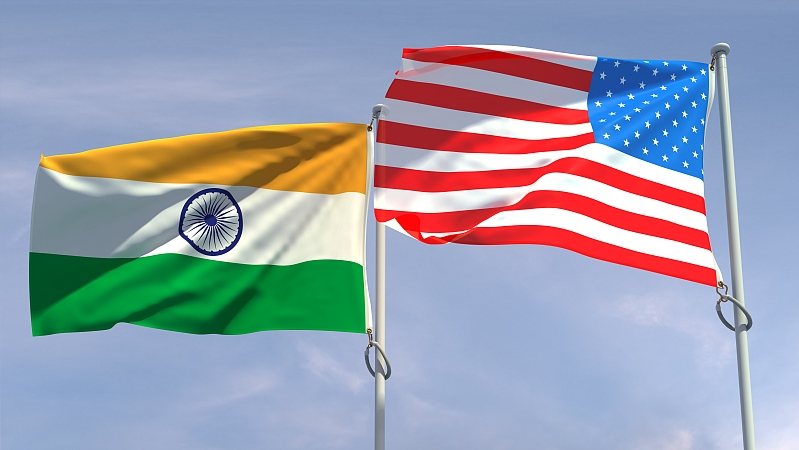
National flags of India and the U.S. /CFP
National flags of India and the U.S. /CFP
Editor's note: Emilia Fernandez, a special commentator for CGTN, is a security and political analyst with a focus on South Asian geopolitics, and PhD researcher at the University of Lucerne, Switzerland. The article reflects the author's views and not necessarily those of CGTN.
Indian Prime Minister Narendra Modi's recent U.S. visit revived the question: Should New Delhi allow Washington to leverage their ties to counter China's increased influence in the Asia-Pacific region? The decision of whether India should accept the U.S. containment plan is a multifaceted and complex issue that demands an in-depth analysis of political, socio-economic, and strategic factors.
In recent years, Asia's geopolitical landscape has witnessed dramatic shifts, particularly in the power dynamics between China and the U.S. As China-U.S. rivalry intensifies, the U.S. has been actively seeking alliances as a part of its containment strategy. However, it is crucial for Asian countries especially for India, to carefully calculate the consequences and risks associated with aligning the containment strategy.
This article will shed light on why India should reject the U.S. containment plan, highlighting the potential drawbacks and outlining alternative paths for India's independent foreign policy and strategic sovereignty.
First, India has long been pursuing the policy of preserving strategic autonomy, trying to avoid overreliance on any single superpower, and aiming to maintain independence while making decisions. Aligning with the U.S. containment strategy would definitely jeopardize India's strategic autonomy.
Rather, India should maintain a balanced approach engaging both the China and U.S. on its terms, safeguarding its national interests, and mitigating bilateral and regional tensions independently.
Besides, the two-way trade between China and India has been increasing exponentially as China has been the largest source of India's imports for the last 15 years. In 2022, their bilateral trade reached an all-time high of $135.98 billion. Working with Washington's plan of countering Beijing would have economic repercussions for New Delhi as it would lead to strained trade and investment relations and economic losses.
If India carefully weighs the economic benefits of embracing this containment strategy against the probable loss of disrupting relations with China, India would never agree with this containment strategy.
Furthermore, Asia is home to several security challenges, ranging from territorial disputes to threats of terrorism. If India accepts the U.S. containment plan, it would contribute to heightened tensions between China and the U.S., potentially leading to the escalation of conflicts. As this may bring some potential repercussions of probable regional stability, India should assess whether the containment strategy aligns with India's long-run strategic objectives.
Moreover, India has traditionally pursued a non-alignment policy, maintaining friendly relations with multiple countries, avoiding taking particular sides in global conflicts, and upholding the principles of multilateralism. Accepting Washington's plan would risk New Delhi alienating from Beijing, damaging India's diplomatic bonds with China, upsetting India's diplomatic balance, and leading to greater polarization. India should critically consider the implications of such engagements as it would allow Washington to fish in troubled waters.

Clouds seen hovering over the skies at Connaught Place in New Delhi, India, June 18, 2023. /CFP
Clouds seen hovering over the skies at Connaught Place in New Delhi, India, June 18, 2023. /CFP
Before accepting the containment strategy, India should also remember its role in different multilateral forums such as BRICS, and the Shanghai Cooperation Organization because India's influence in those organizations would be declined if it were to align exclusively with the U.S.
Apart from that, working on the U.S. plans seem like assisting India in addressing its security concerns by enhancing India's military capabilities. However, it is vital to analyze whether relying on the U.S. aligns with India's long-run defense and security objectives. Is India ready to make huge investments and policy adjustments needed for the alignment?
Sixth, the U.S. is constantly pushing India for a confrontational approach toward China. Preferably, India can go for positive engagement with China which would be in line with India's traditional policy of strategic hedging, engaging with multiple powers for optimum benefits. Instead of the containment plan, India can encourage diplomatic dialogues, people-to-people contact, and economic cooperation to address concerns, such as border disputes, trade deficits, etc., more constructively.
Last but not the least, India has cultivated strategic partnerships with various countries, including Russia, Japan, and ASEAN nations. Aligning too closely with the U.S. containment plan would strain such partnerships as India would then be perceived as a U.S. diplomatic tool to serve Washington's foreign policy objectives.
In conclusion, it is imperative for India to critically consider the long-run consequences and repercussions of its alignment with the U.S. Accepting the strategy could turn India into a pawn in a great power rivalry. India should reject the containment plan to protect the national interest, address security concerns, preserve strategic autonomy, sustain Chinese-Indian economic bonds, prioritize regional stability, ensure diplomatic balancing, upgrade its position geopolitical game, and uphold commitment towards multilateralism.
Embracing a balanced and independent foreign policy would allow India to navigate the complex geopolitical dynamics, have the upper hand while negotiating with superpowers, and contribute to a more peaceful and stable Asia.
(If you want to contribute and have specific expertise, please contact us at opinions@cgtn.com. Follow @thouse_opinions on Twitter to discover the latest commentaries in the CGTN Opinion Section.)